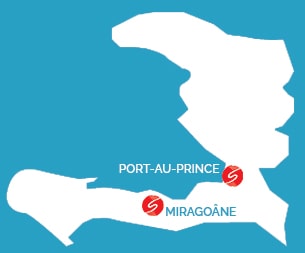
Context
Criminal gangs took full control of whole neighborhoods and vital, strategic infrastructure for two months, including Port-au-Prince international port and the country’s main oil terminal (Varreux). This situation has severely impacted the population’s daily lives.
The crisis was compounded by an upsurge of the cholera epidemic in October 2022. According to humanitarian coordination estimates, 48% of the population needed urgent assistance. In addition, 45% of the population were suffering from hunger, and the country had one of the highest chronic food insecurity rates in the world.
The situation was particularly critical for the numerous internally displaced people living in unsanitary conditions in Port-au-Prince, and for the growing number of forcibly repatriated people from various countries, including the Dominican Republic.
- 11.84 million inhabitants
- 163rd out of 191 countries on the Human Development Index
Our action

-
Mission
opened in From 2004 to 2007, then since 2010 -
Team
3 international staff
33 national staff - Budget 2.17M€
Our teams responded to the upsurge of cholera during 2022. From October onwards, SOLIDARITÉS INTERNATIONAL worked with the Haitian authorities to implement the national cholera eradication strategy, using a twopronged approach: “knock-out” (control) and “shield” (prevention). On the one hand, our organization helped the Ministry’s response teams react quickly to outbreaks. On the other hand, in partnership with the National Directorate for Water, we worked with communities to reduce their exposure to the disease, by improving access to drinking water, circulating cholera prevention messages and managing human excreta.
Institutional and private funding partners UNICEF, CIAA, CDCS, ECHO, START FUND, IOM, Toulouse Metropolitan Authority, Grand Lyon Metropolitan Authority, Europe Aid, FONTO VIVO, City of Paris
Our impact

Preventing risks due to recurrent crises, responding to the vital needs of vulnerable populations
- Participation in the humanitarian early warning system
- Capacity-building for local organizations on emergency responses
- Distribution of essential household goods, “hygiene” kits and “dignity” kits
- Emergency “Water, Sanitation and Hygiene” (WASH) response pack
- Targeted cash distribution for “nutrition”
- Prepositioning of contingency kits

Improving long-term resilience
- Increasing the number of long-term drinking water points and WASH facilities, especially in schools
- Improvement of household food practices
- Consolidation of social water management and governance
Should you have any questions, please contact Justine Muzik Piquemal.

Vacancies
At head office
Worldwide
Internships
